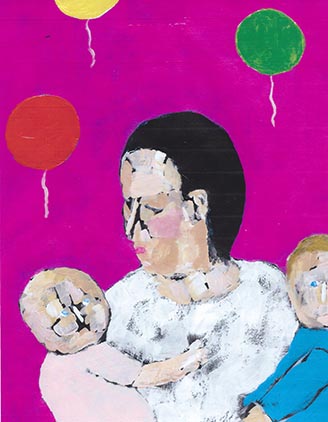C. S. Fuqua
At Some Point
They call kids thugs
and check for guns in lockers.
Born 50 years too late, the girl complains.
I should be marching in the streets,
fists raised in revolt.
What happened to reform, to progress?
Purpose, she says, is subject to time.
In her bedroom,
next to the Gandhi poster
she bides time,
makes plans,
prepares for a world
no longer on its head,
wondering whether the fight is ever won
or only part of some journey
that ends in a classroom,
a precious moment,
a dark day when some kid
has reached the end.Rob Ending
At the time Joe learned he would die,
Rob learned he would survive.
He’d endured chemo and radiation
for two years, setting the cancer
in remission with conditions.
His jaw was the first to go after that,
bones crumbling, skin decomposing
as a treatment aftereffect.
A few shots of Jack relieved the pain,
and what harm could an occasional cigarette do?
The cancer resurged,
took his larynx and tongue,
put him into a state-run, extended-care facility
where he couldn’t get at a bottle or cigarette,
not that either would have done much good
through a feeding tube and a tracheotomy.
He began to feel alive, he said,
yes, on the road to better health and a new jaw,
or so everyone thought until
the new spot in his throat tested positive.
It spread fast.
Like Joe’s.
But Rob didn’t fight like Joe.
On the last day, he asked only for a good shot of Jack.
C. S. Fuqua’s books include White Trash & Southern ~ Collected Poems ~ Vol. I, Hush, Puppy! A Southern Fried Tale (children’s picture book), Rise Up (short fiction collection), The Native American Flute: Myth, History, Craft, Trust Walk (short fiction collection), The Swing: Poems of Fatherhood, Divorced Dads, and Notes to My Becca, among others. His work has appeared in publications such as Main Street Rag, Pudding, Dark Regions, Iodine, Christian Science Monitor, Cemetery Dance, Bogg, Year's Best Horror Stories XIX, XX and XXI, Amelia, Slipstream, The Old Farmer's Almanac, The Writer, and Honolulu Magazine.
